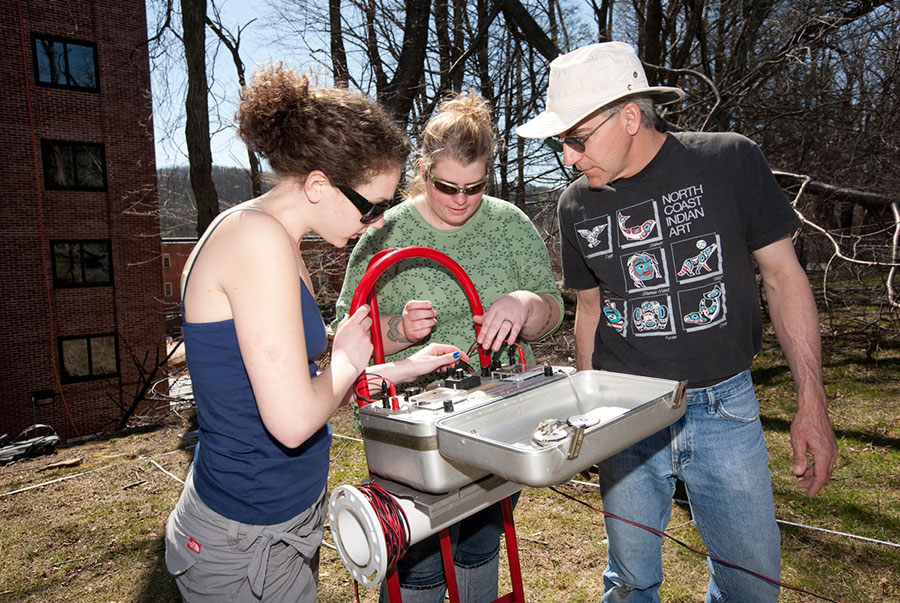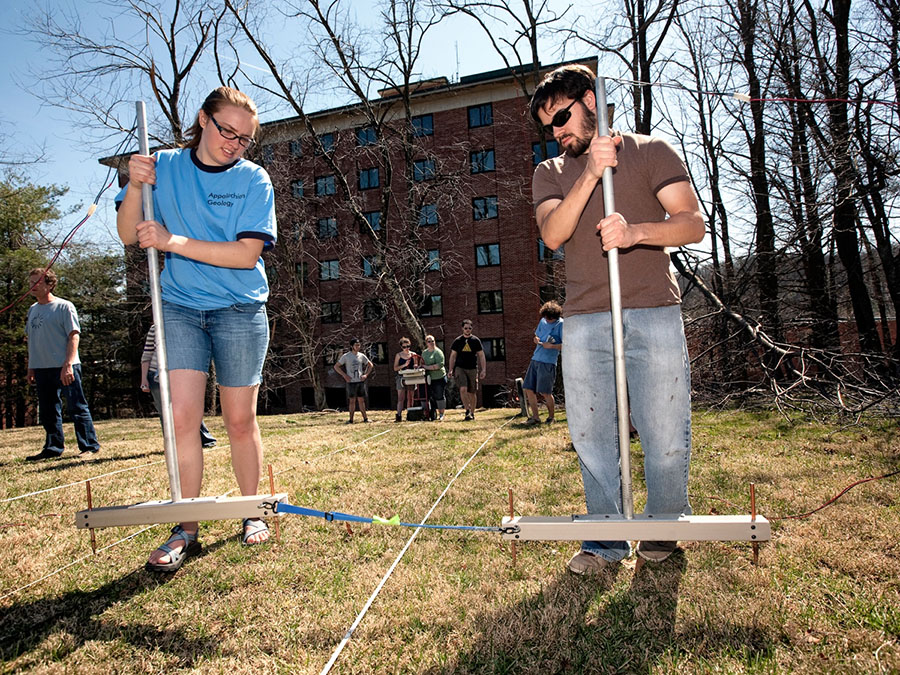
Rachel Storniolo, left, Anna George Hazen, and assistant research associate Keith C. Seramur check readings on an electrical resistivity system used to locate unmarked graves. Variances in the electric current between two electrode probes can indicate disturbed soil below the surface, which can indicate the location of gravesites. Storniolo and Hazen are senior geology majors at Appalachian State University. Seramur is an adjunct assistant research associate in Appalachian’s Department of Geology. (Photo by University Photographer Marie Freeman)
BOONE — Ground-penetrating radar and an electrical resistivity system are being used to confirm the location of African-American graves in the Boone Cemetery.
The cemetery, located just south of Hardin Street and adjacent to the Appalachian State University campus, is divided into two sections, locally referred to as the “white” and “black” sections. The white section is the larger and contains hundreds of well-marked graves within a fenced perimeter. The black section contains only two well-marked graves, which date to the mid-1800s, and many unmarked graves.
Students and professors from Appalachian’s Department of Geology and Department of Anthropology conducted a ground penetrating radar (GPR) survey on a portion of the east or black section of the cemetery in 2007. Sixteen major and many minor anomalies were identified along the hillcrest close to the boundary between the two cemetery sections.
The area was resurveyed in April by geophysics and geoarchaeology students of Drs. Scott Marshall and Ellen Cowan in Appalachian’s Department of Geology to confirm the location of the unmarked graves.

Senior geology major Jessica Norman, left, and junior archeology major Matthew Turney position electrode probes used to survey gravesites in the Boone Cemetery. The Appalachian State University students are part of an ongoing project to locate the unmarked graves of as many as 40 African-Americans who died in Watauga County when the cemetery was in use. (Photo by University Photographer Marie Freeman)
The device used for the second survey was an older electrical resistivity meter upgraded by the College of Arts and Sciences’ electronics and machine shop instrument makers.
Under the direction of Keith C. Seramur, an adjunct assistant research associate in the Department of Geology, and Cowan, students used the equipment to measure electrical resistance between two electrode probes every two feet along a 100-by-100 foot grid. Variances in the electric current can indicate a disturbed soil below the surface and confirm the location of potential unmarked graves identified by the earlier GPR survey.
This initial effort only completed a portion of the grid so additional surveys will be conducted in the future.
While an exact number of gravesites has yet to be determined, historical records indicate that between 30-40 African-Americans died in Watauga County when the cemetery was in use.
“Our work at the Boone cemetery is providing geology students hands on experience with geophysical equipment,” Seramur said. “We also hope to contribute to the preservation of part of Boone’s history and respect for those buried in these unmarked graves by completing this study.”
About the Department of Geological and Environmental Sciences
Located in Western North Carolina, Appalachian State University provides the perfect setting to study geological and environmental sciences. The Department of Geological and Environmental Sciences provides students with a solid foundation on which to prepare for graduate school or build successful careers as scientists, consultants and secondary education teachers. The department offers six degree options in geology and two degree options in environmental science. Learn more at https://earth.appstate.edu.
About the Department of Anthropology
The Department of Anthropology offers a comparative and holistic approach to the study of the human experience. The anthropological perspective provides a broad understanding of the origins as well as the meaning of physical and cultural diversity in the world — past, present and future. Learn more at https://anthro.appstate.edu.
About the College of Arts and Sciences
The College of Arts and Sciences (CAS) at Appalachian State University is home to 17 academic departments, two centers and one residential college. These units span the humanities and the social, mathematical and natural sciences. CAS aims to develop a distinctive identity built upon our university's strengths, traditions and locations. The college’s values lie not only in service to the university and local community, but through inspiring, training, educating and sustaining the development of its students as global citizens. More than 6,800 student majors are enrolled in the college. As the college is also largely responsible for implementing App State’s general education curriculum, it is heavily involved in the education of all students at the university, including those pursuing majors in other colleges. Learn more at https://cas.appstate.edu.
About Appalachian State University
As a premier public institution, Appalachian State University prepares students to lead purposeful lives. App State is one of 17 campuses in the University of North Carolina System, with a national reputation for innovative teaching and opening access to a high-quality, cost-effective education. The university enrolls more than 21,000 students, has a low student-to-faculty ratio and offers more than 150 undergraduate and 80 graduate majors at its Boone and Hickory campuses and through App State Online. Learn more at https://www.appstate.edu.
What do you think?
Share your feedback on this story.











